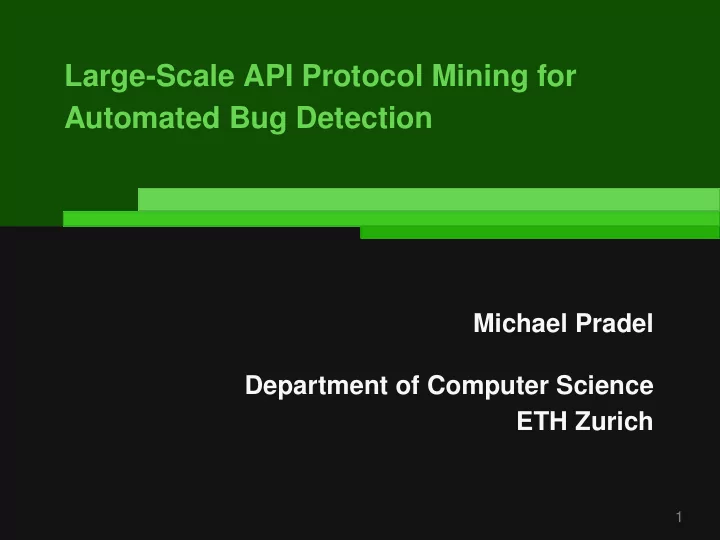

State Partitioning Protocol transformation: Setup states vs. liable states l.add i.hasNext l.iterator new LinkedList → i i.hasNext → l l.add i.next ambiguous → split l.add 29
State Partitioning Protocol transformation: Setup states vs. liable states l.add i.hasNext l.iterator new LinkedList → i i.hasNext → l i.next l.add l.add l.add 29
State Partitioning Protocol transformation: Setup states vs. liable states l.add i.hasNext l.iterator new LinkedList → i i.hasNext → l i.next l.add l.add setup liable l.add 29
Overview Analysis Static Runtime checking verification 30
Overview Analysis Static Runtime checking verification 30
Dynamic Protocol Checking Runtime verification Input (JavaMOP) 31
Dynamic Protocol Checking Runtime verification Input (JavaMOP) Challenge 1: Check many different execution paths 31
Dynamic Protocol Checking Runtime verification Input (JavaMOP) Challenge 1: Challenge 2: Check many different Monitoring execution paths mined protocols 31
Randomly Generated Input Challenge 1: Check many different execution paths Input 32
Randomly Generated Input Challenge 1: Check many different execution paths Input Random test generation 32
Randomly Generated Input Challenge 1: Check many different execution paths Input Random test Call sequences generation that trigger an exception 32
Randomly Generated Input Challenge 1: Check many different execution paths Input Non-exceptional Random test Call sequences sequences generation that trigger an exception 32
Protocol Monitoring Challenge 2: Monitoring mined protocols l = new LinkedList () i.hasNext new LinkedList → l i.iterator → i i.next 33
Protocol Monitoring Challenge 2: Monitoring mined protocols l = new LinkedList () i.hasNext new LinkedList → l i.iterator → i l i.next 33
Protocol Monitoring Challenge 2: Monitoring mined protocols l = new LinkedList () i.hasNext new LinkedList → l i.iterator → i l i.next 33
Protocol Monitoring Challenge 2: Monitoring mined protocols l = new LinkedList () Violation!? i.hasNext new LinkedList → l i.iterator → i l i.next 33
Protocol Monitoring Challenge 2: Monitoring mined protocols l = new LinkedList () i1 = l.iterator () i2.next() i.hasNext new LinkedList → l i.iterator → i l i.next 33
Protocol Monitoring Challenge 2: Monitoring mined protocols l = new LinkedList () i1 = l.iterator () i2.next() i.hasNext new LinkedList → l i.iterator → i (l,i1) i.next 33
Protocol Monitoring Challenge 2: Monitoring mined protocols l = new LinkedList () i1 = l.iterator () i2.next() i.hasNext new LinkedList → l i.iterator → i (l,i1) i2 i.next 33
Protocol Monitoring Challenge 2: Monitoring mined protocols l = new LinkedList () i1 = l.iterator () Violation!? i2.next() i.hasNext new LinkedList → l i.iterator → i (l,i1) i2 i.next 33
Protocol Monitoring Challenge 2: Monitoring mined protocols l = new LinkedList () i1 = l.iterator () Naive approach gives Violation!? i2.next() too many violations i.hasNext new LinkedList → l i.iterator → i (l,i1) i2 i.next 33
Explicit Fail Transitions Fail only in liable states i.hasNext new LinkedList → l i.iterator → i i.next i.next i.hasNext F 34
Explicit Fail Transitions Fail only in liable states i.hasNext new LinkedList → l i.iterator → i i.next i.next i.hasNext Violation: F � Reach fail state � End in non-final, liable state 34
Evaluation Questions � Find relevant issues by monitoring mined protocols? � How useful is generated input? Setup: DaCapo benchmarks, 1.6 MLOC Java 35
Results Randomly generated Protocol violations Bug (exception, Program Test cases Total Relevant unexpected behavior) avrora 15,753 5 4 or batik 3,477 0 0 code smell (perfor- daytrader 32,446 0 0 eclipse 816 0 0 mance/maintainability fop 6,536 52 50 problem) h2 7,584 14 7 lucene 1,985 0 0 pmd 1,286 0 0 sunflow 4,300 1 0 tomcat 14,627 1 1 xalan 21,083 1 1 Sum 160,857 74 63 36
Results Randomly generated Protocol violations Bug (exception, Program Test cases Total Relevant unexpected behavior) avrora 15,753 5 4 or batik 3,477 0 0 code smell (perfor- daytrader 32,446 0 0 eclipse 816 0 0 mance/maintainability fop 6,536 52 50 problem) h2 7,584 14 7 lucene 1,985 0 0 pmd 1,286 0 0 sunflow 4,300 1 0 tomcat 14,627 1 1 85% true xalan 21,083 1 1 Sum 160,857 74 63 positives 36
Examples try { is = u.openStream (); r = new InputStreamReader(is, "UTF -8"); br = new BufferedReader(r); } finally { if ( is != null ){ try { is.close (); } catch ( IOException ignored ){} is = null; } if ( r != null ){ try{ r.close (); } catch ( IOException ignored ){} r = null; } if ( br == null ){ try{ br.close (); } catch ( IOException ignored ){} br = null; } 37 }
Examples try { is = u.openStream (); r = new InputStreamReader(is, "UTF -8"); br = new BufferedReader(r); } finally { if ( is != null ){ try { is.close (); } catch ( IOException ignored ){} is = null; } if ( r != null ){ try{ r.close (); } catch ( IOException ignored ){} r = null; } if ( br == null ){ try{ br.close (); } catch ( IOException ignored ){} br = null; Reader never closed } 37 }
Examples Iterator i = pinConnections.iterator (); PinLink currLink = (PinConnect.PinLink) i.next (); currLink.propagateSignals (); while (i.hasNext ()) { currLink = (PinConnect.PinLink) i.next (); currLink.propagateSignals (); } 38
Examples Iterator i = pinConnections.iterator (); PinLink currLink = (PinConnect.PinLink) i.next (); currLink.propagateSignals (); while (i.hasNext ()) { currLink = (PinConnect.PinLink) i.next (); currLink.propagateSignals (); } Incorrect iterator usage 38
Normal vs. Generated Input 39
Overview Analysis Static Runtime checking verification 40
Overview Analysis Static Runtime checking verification 40
State of the Art + specification Typestate Anomaly checking detection 41
State of the Art + specification Typestate Anomaly checking detection + Precise + Automatic - Needs specification - Imprecise 41
State of the Art + specification Typestate Anomaly checking detection + Precise + Automatic - Needs specification - Imprecise Combine both! Precise checker for mined multi-object protocols 41
Recommend
More recommend